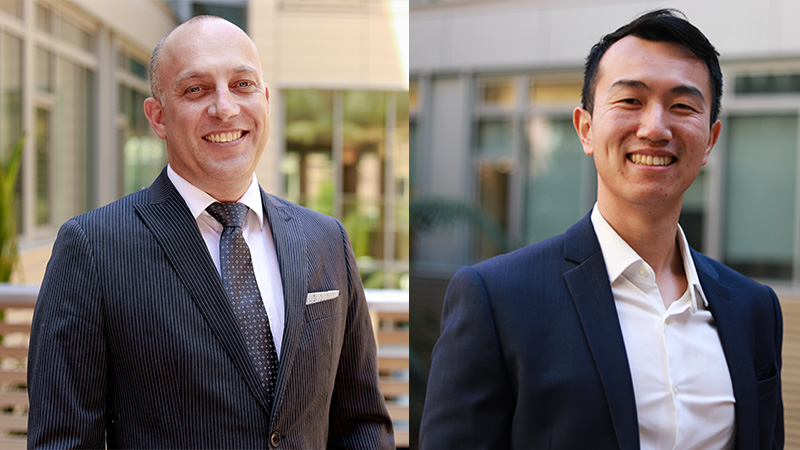UCLA Engineering Awarded $1.5 Million State-Funded Grants from UC to Spur Climate Action
Efforts will address earthquake hazards and energy storage

UCLA Samueli
UCLA Engineering professors Scott Brandenberg (left) and Yuzhang Li (right) have been awarded California Climate Action grants by University of California to lead two research projects.
Two UCLA Samueli School of Engineering professors have been selected to lead research projects funded by the California Climate Action Seed Grants and Matching Grants designed to address the state’s climate priorities.
Sea Level Rise Impacts on Earthquake-Induced Soil Liquefaction
Scott Brandenberg, a professor of civil and environmental engineering, will serve as the principal investigator on the project with a two-year, $520,000 grant. Timu Gallien, an associate professor of civil and environmental engineering, will serve as a co-project investigator. As sea levels rise due to earthquakes, so do groundwater levels in coastal areas, resulting in increased risks of expanded liquefaction hazard zones. Earthquake liquefaction can cause major infrastructure damages and occurs when loosely packed, waterlogged soil near or at the ground surface beneath buildings and other structures loses its density and strength in response to strong ground shaking.
In collaboration with the California Geological Survey, the California Seismic Safety Commission, the California Office of Emergency Services and the U.S. Geological Survey; Brandenberg and Gallien will lead a research team to map liquefaction hazard severity in California by integrating groundwater modeling, sea level rise projections, geotechnical site investigation data, seismic hazard analysis and liquefaction analysis. Findings from the research will help predict areas in California that are prone to soil liquefaction, thereby enabling measures to reduce structural damage and save lives.
Laser-Scribed Battery Electrodes to Enable California Grid-Scale Energy Storage
Yuzhang Li, an assistant professor of chemical and biomolecular engineering, will lead the project designed to enable grid-scale energy storage with $1 million in funding over two years. Carbon-free electric grids rely on power stored from renewable yet intermittent energy sources such as wind and solar. Li will lead a team to address the challenge with affordable, safe and long-lasting battery technology needed for more efficient and effective power storage.
Li will partner with Richard Kaner, a UCLA distinguished professor and the Dr. Myung Ki Hong Professor of Materials Innovation with joint appointments in the Department of Materials Science and Engineering and the Department of Chemistry and Biochemistry. The pair will build upon their research funded by the California NanoSystems Institute at UCLA to develop zinc chemistry-based battery technology for grid-scale use. The team plans to develop a high-capacity cathode material using a technique called laser-scribed synthesis, and to demonstrate its capabilities using cryogenic electron microscopy, or cryo-EM.
In addition to the two UCLA Samueli-led projects, Alvar Escriva-Bou — an assistant professor of civil and environmental engineering at UCLA Samueli — will contribute to a research project led by UC Berkeley. “Equitable Stewardship of California’s Water in a Changing Climate” aims to build an equitable and resilient water system. The team plans to leverage existing models used to operate California’s major water supply systems to produce a novel library of climate scenarios for sustainable water system operations, democratizing water allocation information in the process.
The California Climate Action grants are part of $185 million allocated by the state of California to support University of California (UC) climate initiatives designed to help advance the state’s climate goals. Totaling $83 million, the grants will fund 38 projects involving more than 130 community, industry, tribal and public agencies, as well as 12 UC locations, 11 California State University campuses and two private universities. Five projects will be led by UCLA — two spearheaded by UCLA Samueli, two by faculty members of the UCLA Fielding School of Public Health and one by the UCLA Labor Occupational Safety and Health Program.
